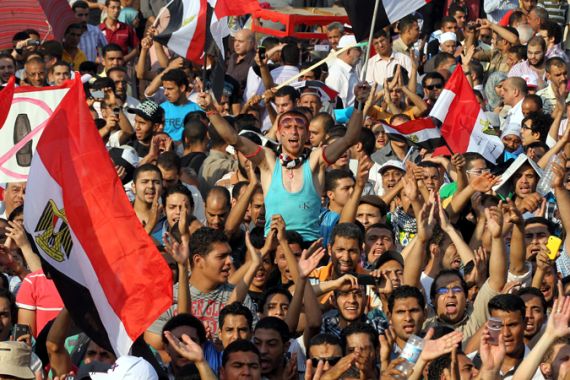Protesters press political demands in Egypt
Thousands descend on Cairo square for the fourth straight night to demand Ahmed Shafik’s removal from presidential race.

Thousands of protesters have converged in Cairo’s Tahrir Square for the fourth night in a row to protest against Ahmed Shafik, the presidential candidate widely seen as a representative of Hosni Mubarak’s deposed regime.
Crowds marched to the square from several locations in the capital, led by two defeated candidates from the first round of the presidential ballot.
They have demanded that Shafik, a former military man who was Mubarak’s final prime minister, withdraw from the runoff election scheduled to begin on June 16. Many are also angry with the Muslim Brotherhood’s Mohammed Morsi, the other contender in the runoff.
“Neither Shafik nor Morsi are any good,” Arafa Mohamed, 21, told the Associated Press news agency. “They have to pull out of the presidential race. One is from the former regime, and one has no political experience and has a group’s Islamist agenda.”
Tuesday’s marches were led by Hamdeen Sabbahi, a liberal, and Abdel Moneim Aboul Fotouh, a moderate Islamist and former member of the Brotherhood. They placed third and fourth in last month’s election.
Thousands of people also turned out to protest in the northern city of Alexandria, and small demonstrations were reported elsewhere around the country.
A presidential council?
This latest wave of protests began on Saturday after a Cairo court sentenced Mubarak to life in prison for complicity in killing protesters during last year’s revolution.
The verdict led to widespread anger because Mubarak’s two sons, Gamal and Alaa, were acquitted of corruption charges, and several senior security officials were found not guilty of murder.
Many of the protesters come from revolutionary groups like the April 6 youth movement, which distrust the Muslim Brotherhood for breaking an earlier pledge not to field a presidential candidate.
The Brotherhood has endorsed these protests – it called the Mubarak verdict “shocking” – but has rejected any calls to delay the election.
Morsi met on Monday Sabbahi, Aboul Fotouh and Khaled Ali, another defeated liberal candidate.
The three failed contenders have called for a “presidential council,” a civilian body which would rule Egypt. Morsi did not endorse the idea, though – some media reports say he rejected it outright – and the Brotherhood has suggested it would be unconstitutional.
Shafik could be banned
The idea of a “presidential council’ is controversial even among some Egyptian liberals: Amr Hamzawy, the liberal member of parliament from the Cairo district of Heliopolis, said it would be “incompatible with democracy”.
Shafik, meanwhile, has escalated his attacks on Morsi in advance of the runoff. In a televised interview on Monday night, he accused the Muslim Brotherhood of killing protesters in Tahrir Square during the revolution last year, but did not elaborate.
The runoff election should be the final step in Egypt’s transition to civilian rule. The Supreme Council of the Armed Forces, Egypt’s military rulers, has promised to hand over power to a civilian president on June 30.
But questions remain about whether it can go forward as scheduled. In addition to the push for a presidential council, there is also a chance Shafik will be disqualified, because of a “political exclusion” law passed by parliament earlier this year which bans ex-regime officials from running for office.
Egypt’s high court is due to rule later this month on whether the law is constitutional.